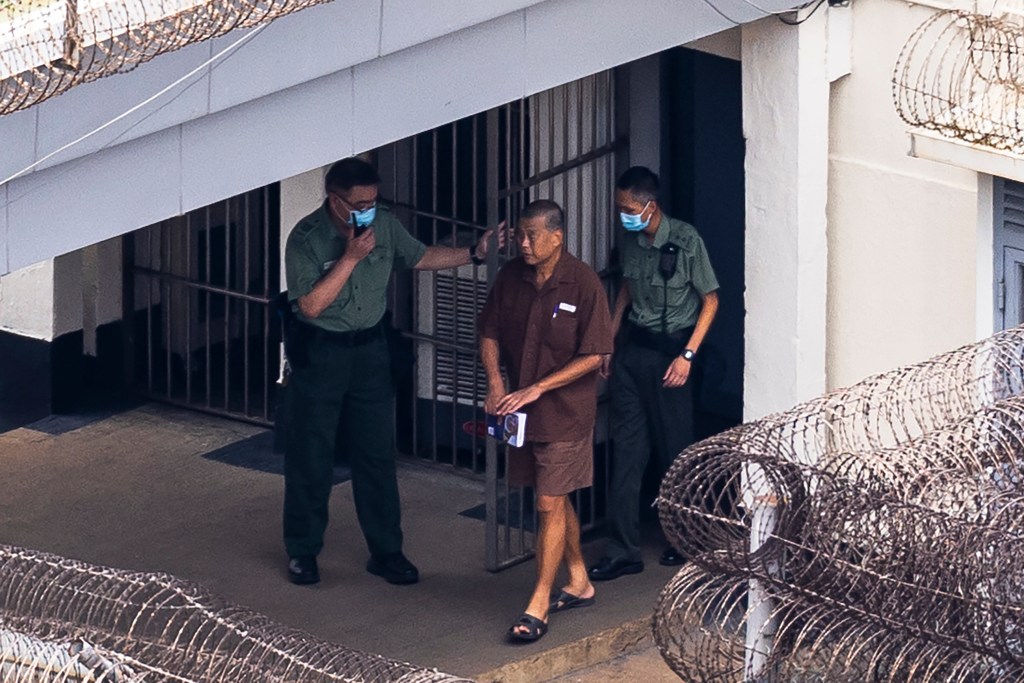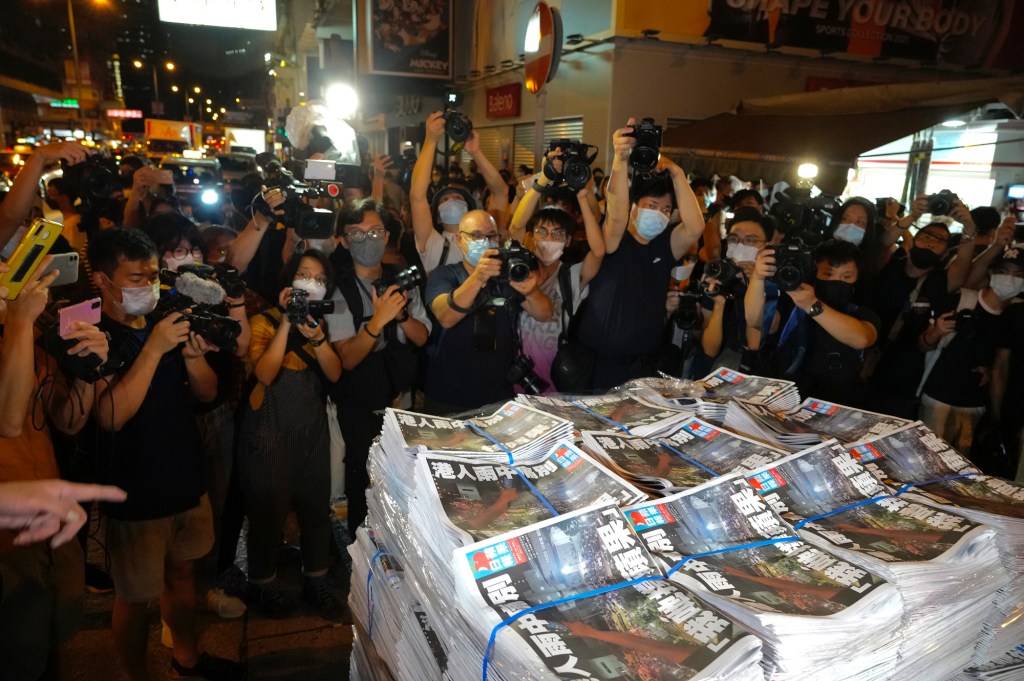New York, June 30, 2025—Hong Kong, an international financial hub and once a beacon of free media, is now in the grip of a rapid decline in press freedom that threatens the city’s status as a global financial information center.
Three journalists told CPJ that investigative reporting on major economic events, a cornerstone of Hong Kong’s financial transparency, has nearly disappeared amid government pressure and the departure of major outlets.
The sharp decline in press freedom, the journalists said, is a direct result of the National Security Law. This law, enacted on June 30, 2020, was imposed directly by Beijing, bypassing Hong Kong’s local legislature, and included offenses for secession, subversion, terrorist activities, and collusion with foreign forces, with penalties ranging from a three years to life imprisonment.
In the five years since it was enacted, authorities have shut down media outlets and arrested several journalists, including Jimmy Lai, the founder of one of Hong Kong’s largest newspapers, the pro-democracy Apple Daily. Several major international news organizations have either relocated or downsized their operations in Hong Kong, leading to a decline in reporting on the city and its financial hub.
“Hong Kong’s economic boom happened because journalists could work without interference,” said a veteran reporter with 11 years’ experience in television, newspapers, and digital platforms in Hong Kong, who spoke to CPJ on condition of anonymity due to security concerns.
While markets still function, at least three media professionals told CPJ that the erosion of press freedom — often overlooked — is a key factor behind Hong Kong’s fading financial appeal to market participants. One reporter described the media as “paralyzed.”
Another hastily passed security law enacted in March 2024 in Hong Kong further deepened fears that it would be used to suppress press freedom and prosecute journalists.

“There has never been an international financial center in history that operates with restrictions on information,” Simon Lee, an economic commentator and former assistant CEO of Next Digital Group, the parent company of Apple Daily, told CPJ.
Hong Kong long served as a base for reporting on China’s economy and power structures, said a former financial journalist on the condition of anonymity, citing safety concerns.
“Most Hong Kong-listed companies come from the mainland [China]. Foreign media used Hong Kong to observe China’s economic operations or wealth transfers,” the former financial journalist told CPJ. “Now the risks feel similar to reporting from inside China.”
Crackdowns, shutdowns, and an exodus of major media
Since the introduction of the National Security Law in 2020, at least eight media outlets have shut. These included Apple Daily, news and lifestyle magazine Next Magazine, both published by Lai’s Next Digital group, and the online outlet Stand News, after they were raided by authorities.
At least four other media organizations — Post852, DB channel, Citizen News, and FactWire — ceased operations voluntarily, citing concerns over the deteriorating political environment.
Reporting was also criminalized in several cases, with journalists prosecuted for “inciting subversion” or “colluding with foreign forces.”
China had the world’s highest number of imprisoned journalists in CPJ’s latest prison census — 50 in total, including eight in Hong Kong.
The New York Times moved part of its newsroom to Seoul in 2020. In March 2024, Radio Free Asia closed its Hong Kong office, and in May, The Wall Street Journal relocated its Asia headquarters to Singapore.
“With fewer foreign correspondents based in the city, there’s simply less reporting on Hong Kong,” the former financial journalist told CPJ. “As a result, the city’s economy may receive less objective attention on the global stage.”
The former financial journalist said that one of the biggest losses after the security law was the disappearance of Apple Daily. Unlike most local media, which focused on routine market updates, Apple Daily connected business to politics and mapped interest networks — an increasingly rare practice.

Next Digital, through Apple Daily, built a reputation for investigative financial reporting. A former staff member told the BBC that the company once spent over 100,000 yuan (US$14,000) tracing dozens of property owners to uncover a developer’s hidden ties with a bank.
“From a financial news perspective, one of our biggest problems is losing Apple Daily,” the former financial journalist told CPJ.
Local business reporting also fades away
As Hong Kong’s financial hub reputation comes under question, stories on high unemployment rates, struggling small businesses, and store closures are increasingly out of sight.
“One direct effect is feeling increasingly unable to grasp what’s happening in the city; important information no longer seems easy to access,” Lee said. “Previously, competition among professional outlets encouraged source sharing and helped maintain a power balance. Now, one-way government-controlled information faces little resistance.”
Lee told CPJ that changes in Hong Kong’s media landscape are particularly evident in major financial events, pointing to the coverage of the 2024 sale of Li Ka-shing’s port assets, in which local outlets failed to question the deal’s structure, rationale, or political implications.
“Beijing called it a national security matter, and the other side of the story disappeared,” Lee told CPJ. “Many focus on the judicial system when discussing fairness, but true fairness also depends on the free flow of information … Without information freedom, public oversight fades, and the market’s system of checks and balances collapses.”
Lee also cited the case of Alvin Chau, a casino tycoon in Macao who was sentenced in 2023 to 18 years for illegal gambling. While foreign media uncovered his alleged links to oil smuggling operations to North Korea, local media offered little follow-up.
“These investigations and reports simply no longer exist,” Lee said.
Sources can’t speak freely
Two journalists told CPJ they have noticed increasing reluctance from interviewees.
During previous years of the Annual Budget Speech, Hong Kong’s yearly announcement of its public spending and economic plans, the media would host analysis shows with economists debating government spending and policies.
“We would ask about the fiscal surplus, support for the poor, and whether measures were targeted,” the veteran reporter told CPJ, adding that now, “only one professor is willing to speak openly.”
Lee told CPJ that the atmosphere of “not being allowed to criticize” the broader structure or government policy has also extended to the reporting on how financial markets operate.
Market participants should be free to take either optimistic or pessimistic views of the economic outlook, Lee told CPJ, adding that today in Hong Kong, it is discouraged to express pessimism, and even silently shifting toward defensive investment strategies or risk-averse behavior may be interpreted as making a political statement.
“It’s hard for any place with such high information costs to remain a global financial hub,” Lee said. “Because even pulling back on investment can send a signal. If investors are accused of intentionally dragging down the market just because they try to hedge or take a cautious view, they may decide it’s safer to avoid the market altogether.”
In response to CPJ’s request for comment, a Hong Kong government spokesperson referred CPJ to a statement that said the security law has enabled the city to “make a major transition from chaos to order” and “the business environment has continuously improved,” while press freedom is protected under the law.
This content originally appeared on Committee to Protect Journalists and was authored by CPJ’s Asia-Pacific program staff.
This post was originally published on Radio Free.